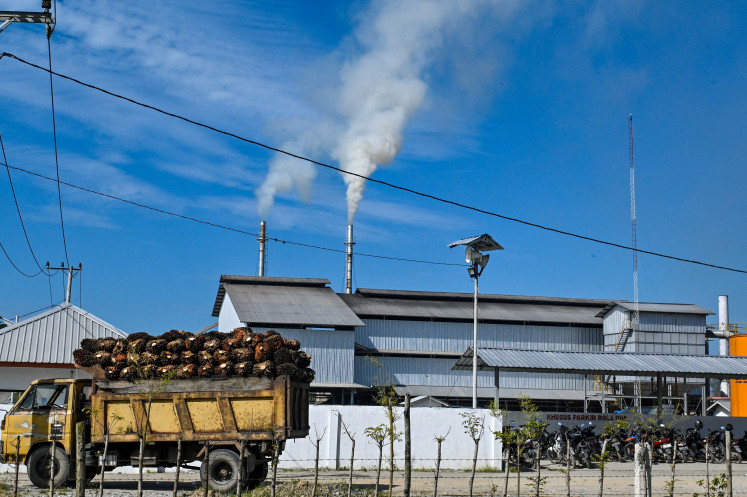Popular Reads
Top Results
Can't find what you're looking for?
View all search resultsPopular Reads
Top Results
Can't find what you're looking for?
View all search resultsJava rebounds from eruption
Life is returning to normal for those living close to Mount Kelud in East Java after the volcano spewed ash across parts of Java on Thursday
Change text size
Gift Premium Articles
to Anyone
Life is returning to normal for those living close to Mount Kelud in East Java after the volcano spewed ash across parts of Java on Thursday.
Purwandi, a resident of Kediri, East Java, whose house was located some 10 kilometers from the volcano, was busy washing his motorbike after cleaning his house of volcanic materials.
'I am not afraid of returning home because, based on past experiences as told by the elders, the volcano only erupted once. It erupted and that's it,' he told The Jakarta Post on Saturday.
Purwandi was just one of many residents who chose to return home, ignoring the government's warnings.
'I don't want to stay at the evacuation shelter. There are too many people there. Some evacuees told me that there was no food or water at the shelter,' said Misiem, Purwandi's wife, while cooking in her kitchen.
Lumadi, another resident, was also busy drying corn harvested one day before Mt. Kelud erupted.
Mt. Kelud erupted on Thursday at about 9:30 p.m. local time, just a few minutes after the Volcanology and Geological Disaster Mitigation Center (PVMBG) declared a high-alert status.
Thick volcanic ash showered cities in Yogyakarta, Central Java and West Java, which are situated hundreds of kilometers from the volcano, sending residents into a panic and forcing authorities to close several airports. At least seven lives were lost as a result of the disaster, according to Mursyidah, of the Malang Health Agency.
Gede Suantika of the PVMBG said that the volcano would not erupt again in the near future, but he called on people to avoid conducting activities in the danger zone within a 10-kilometer radius of the volcano.
On Saturday, authorities and residents in Yogyakarta and a number of cities in Central Java also began cleaning up thick layers of volcanic ash.
In Yogyakarta, people were busy clearing roads and other public places in their neighborhoods by spraying the ash away with water. Some even rented diesel pumps to do so.
They did not complain, although their efforts at times seemed futile as the wind and passing vehicles made the ash fly around and create a mess in other locations.
Many have expressed the hope that rain would fall over Yogyakarta, but the Yogyakarta Meteorology, Climatology and Geophysics Agency (BMKG) said that rain would only fall over the region on Feb. 20.
Yogyakarta Governor Hamengkubuwono X declared emergency status in the province as of Friday, due to thick layers of ash on the ground and a high content of ash in the air.
In Bantul, dozens of people have been admitted to hospitals, either due to traffic accidents resulting from limited visibility on the roads or because of respiratory disorders.
Cleaning activities were also under way on the runway of Yogyakarta's Adisucipto International Airport, which as of Saturday was not yet operational.
The airport's spokesperson, Faisal Indra Kusuma, said the cleaning took time because the thick layer of volcanic ash had turned into sticky mud.
The same activities were seen at Surakarta's Adi Soemarmo airport. While the airport employees cleaned up the runway, those from flight companies cleaned their respective aircraft.
'We have no idea when the airport will resume operations,' said general manager of state-owned operator PT Angkasa Pura I, Abdullah Usman.
In Surakarta, military and police personnel, volunteers from the Indonesian Red Cross (PMI) and local residents joined forces to clean up the city's major roads from ash.
'The priority is cleaning up the city's main roads,' head of the regional Disaster Mitigation Agency (BPBD), Eko Nugroho, said on Saturday.
Volcanic ash has also forced the organizing committee of Surakarta's 269th anniversary to cancel two of its four planned events ' the Solo Carnival and the Porridge Festvial ' initially scheduled for Sunday.
A different situation was experienced at Semarang's Ahmad Yani International Airport, which resumed operations on Saturday morning as it was considered safe for flights.
Rain over parts of the city on Friday morning helped to clean ash from streets and the roofs of houses. Some schools were still closed on Saturday, but others had already resumed activities.
Meanwhile, the disaster has also paralyzed the tourist sector, as the Buddhist Borobudur Temple, Hindu Prambanan Temple and Ratu Boko Temple will be closed to the public for an unspecified period of time, Antara reported.
Borobudur Conservation Center head Marsis Sutopo said that tarpaulin covers had been used to cover 72 stupas, including the main one, and the floors of the temple's seventh to 10th storys.
The effort is aimed at protecting the World Heritage site from any damage that could be caused by the volcanic ash shower. It is predicted that it will take seven to 10 days to clean the temple of ash.
Kusumasari Ayuningtyas, Slamet Susanto, Suherdjoko and Ainur Rohmah contributed reporting from Surakarta, Yogyakarta and Semarang.










